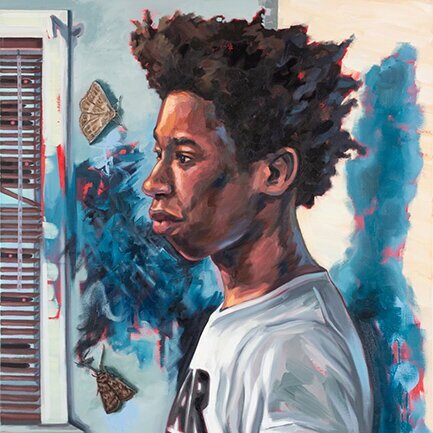Quilt Maker Phyllis Stephens: Image Maker
“It’s stories that live inside me and they don’t all belong to me.”
Quilted Narratives
Fifth-generation quilt maker, Phyllis Stephens, will be the first to tell you that all of her beautiful quilts have a story. “They are all narrative.” She says directly. “I say this all the time it’s stories that live inside me and they don’t all belong to me.” (57:50) Beyond the layer of cut fabrics and dynamic compositions, Phyllis is speaking about the experiences of Black people that she’s collected, like her fabrics, over her long career. She is an award-winning quilt maker that has shown work in prestigious museums such as the Museum of American Quilters Society in Paducah, Kentucky, and the Fine Arts Museum of Ghana Africa and sells work in galleries such as the Richard Beavers Gallery and with Black Art in America. She is an art dealer and an avid art collector.
“A Natural Woman”, Quilt with Sustainable Fabric, by Phillip Stephens, 2020
Phyllis’ latest series, titled “Natural Beauty”, is based on the experiences of her close family friend that recently graduated from college. After moving to Arkansas for a new job, the young woman was told that she was going to terminated if she did not cut her locks because they were not professional. The anger Phyllis felt from hearing that became the fuel for this new body of work that confronts the issues around having your image being defined by someone that doesn’t look like you.
‘You can't determine what's going on with us. You don't understand. You ain't walk my walk. You ain't seen what a straightening comb looks like. You don't know nothing. And you can't determine for me what my beauty is. I determine that for myself. And if I think my beauty is a piercing or tattooing or, you know, nappy hair, or straight hair or locked hair. That's what I determine for myself. That’s your body.” (10:44)
Society has continuously shifted the beauty standards at its own whims and often because of the trends that were seen in Black bodies and Black culture. She said, “I remember when Twiggy was the icon of beauty. Straight up and down... flat in every area. Then they figured out how to get that lip, them hips that booty thing. Yall think Jennifer Lopez and Kim Kardashian created that. I grew up with that.” (8:54) Phyllis fights against these hypocritical notions of outside authority on Black culture from a society that disregards notions of Black beauty while at the same time imitating the very characteristics that they claim to hate.
“They love our culture. They love who we are. They just don't like us. But they don't get to tell us how to wear hair, our natural hair to God gave us. They don't get to tell us that that's ugly, unprofessional, inappropriate.” (9:38)
“Pretty Fabrics Make Pretty Quilts”
She has a huge collection of fabrics in all varieties of colors and patterns. Two huge rooms she said. One reason is that “Pretty fabrics make pretty quilts” (37:23). The other reason is that the fabrics have to work together and transcend their materiality. In her piece, “ A Natural Woman”, lions and tigers are arrayed in the background representing how the Black woman has been around from the beginning of time. The Black woman, the tree, the ground is all built from the patterned pieces the same way we Black people have always taken what they were given and created something wonderful.
“I'm creating images. And so I buy fabric that looks like a tree trunk or looks like leaves or looks like a sky. You know, it looks like it. It gives me the feel of those things. So, you know, I'm trying to create a picture by using fabrics.. I'm cutting it. I'm cutting out the fabric and shapes. But that piece of fabric has to transcend just being a flat piece of fabric into a sky.” (37:37)
“Image Maker”, Quilt with Sustainable Fabric, by Phillip Stevens
Little Shepherd Girl
The idea of family is a constant refrain for Phyllis. She has a very warm, loving spirit that she expresses only in how she supports other people and artists. Close friends, fellow artists, nieces, and nephews are all a part of how she sees the world. She approaches her work with the same empathy and compassion. This is one of the reasons incidents of police brutality and racist incidents have affected her so deeply. “It's a dangerous situation for Black America. For Black Americans at this time is a dangerous situation. We have to be careful and we have to pay attention to it. You know, for us creators, we have to create some stories, to tell the truth. That visually tells the truth. This is our time to stand on that.” (15:22)
Phyllis spoke lovingly of her mother, who she said is her image maker that set the standard for how she felt about herself, and her grandmother, an avid gardener that taught her how to quilt. From these two strong women figures in her life, she received a perspective on how hard work equals success and an intense belief that she could do anything. She said her mother was a believer. “Whatever you told my mother that you wanted to do, she made you believe that you could do it. That's like the greatest mama in the world” (44:29). It is this strength of self that inspires Phyllis to continue to create her magnificent quilts and continue to connect with and nurture her fellow artists.
“You know, I'm always trying to say a prayer, a kind word, support, and promote. That's why I'm a little shepherd girl.” (1:07:23)
Follow Phyllis Stephens: www.phyllisstephensart.com + @little_shepard_girl
Listen to the full interview on Studio Noize Episode 90
Links
https://nationalmuseum.ghana-net.com/index.html
https://www.blackartinamerica.com/index.php/2018/11/09/the-quilting-tradition/





















